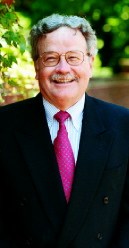His nine-year deanship at the Harvard Graduate School of Education concluded, Jerome T. Murphy still fizzes with ideas about public schooling. Current American debate over education, he says, reflects the collision between a salutary social development--"There is an increased emphasis on high standards for all kids"--and an institutional reality--"Our expectations have grown much faster than the performance of the schools."
 |
| Jerome T. Murphy |
| Photograph by Eric Fowke |
Leadership tops Murphy's list of personal interests. In an impossibly overcrowded schedule for his sabbatical year, he hopes to catch up on nine years of deferred reading; explore effective leadership training in business, the military, and overseas, looking for applications to the problems of U.S. school superintendents and principals; revive a research agenda and write about the intertwined problems of leadership and management in sluggish organizations; and prepare to resume teaching a year hence (he is Harold Howe II professor of education). To get in shape for that marathon agenda, he also plans to go trekking in Nepal this October.
If the departing dean is fit, he thinks his school is, too. He cites new programs spanning the spectrum from instruction to urban school leadership, and a much higher profile for debate about important questions thanks to the school's Askwith Education Forum, now an endowed speaker series. The school's core strength, he says, is a "fabulous senior faculty who have a wonderful, scholarly orientation but a real focus on issues of practice." The school's capital campaign raised $111 million, nearly twice its goal, under his leadership, and was able to endow 16 professorships, tripling the number of named chairs.
Murphy envisions his successor pursuing international relationships and research. Professors Howard Gardner and Marcelo Suarez-Orozco, for instance, have just begun a study of globalization, seeking to understand common problems of urban schooling on different continents in the context of economic, technological, and demographic changes. What they learn might be shared worldwide through distance-learning tools, another opportunity rising in prominence on the school's agenda. Certainly the new gender-studies center (see May-June, page 65), with three more professorships, will tie in to both international and technology initiatives. And there is much to be learned about leadership through collaborative efforts with faculty members at the Business School and the Kennedy School of Government.
In the meantime, sustaining the education school's momentum will be up to an interim dean, named by President Neil L. Rudenstine after this issue went to press. Shaping the agenda thereafter will be the responsibility of whomever President Lawrence H. Summers selects as dean.




